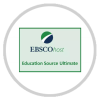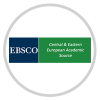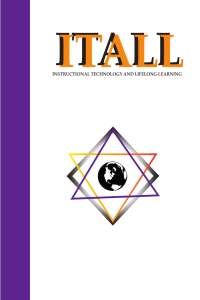Teaching Practice
Research Article
Aim & Scope
Instructional Technology and Lifelong Learning is an international scientific journal that provides opportunities for researchers from various fields to produce interdisciplinary studies and aims to contribute to its knowledge in this field.
ITALL publishes research and reviews articles on instructional technologies and lifelong learning. Instructional Technologies and Lifelong Learning is an international peer-reviewed journal published twice yearly in June and December.
Author Guidelines
Click here for the article template.
The manuscripts to be sent to Instructional Technology and Lifelong Learning Journal must have the following form characteristics in terms of publication unity.
The texts in the manuscript should be in the Palatino Linotype font, justified, 11 points, and 1.5 lines spaced. Line spacing of each paragraph should be written after 6 nk space. The manuscript should be prepared in a single column.
The manuscript's title should reflect the text's content and should not be longer than necessary. The title in Turkish and English should be 12 points, bold, justified, the first letters of the words should be capitalized, and 6 nk space before and after.
Manuscripts submitted to the journal should be written in English title, author / author(s) information, abstract, keywords, Turkish title, abstract and keywords in Turkish, manuscript text, references, and extended summary order.
Click here for the copyright form.
Click to see how you can submit an article.
Ethical Principles and Publication Policy
PUBLICATION ETHICS
The Journal of Instructional Technologies and Lifelong Learning (ITALL) follows a process based on producing, developing, and sharing knowledge in a scientific and reputable manner, using a neutral and unbiased scientific method to publish original and high-quality studies related to instructional technologies and lifelong learning. In this process, any unethical behavior is unacceptable.Peer-reviewed studies embody and support the scientific method, ensuring its implementation and impartiality. Authors, reviewers, and editors participating in scientific production must adhere to ethical principles. The ethical duties and responsibilities stated below have been prepared based on the recommendations and guidelines developed by the Committee on Publication Ethics (COPE), Council of Science Editors (CSE), World Association of Medical Editors (WAME), and International Committee of Medical Journal Editors (ICMJE) for journal editors. All stakeholders under ITALL's publication ethics must comply with the following ethical duties and responsibilities.
EDITORIAL RESPONSIBILITIES OF EDITORS
The editorial board is responsible for the papers submitted to ITALL and the processes after publication. This responsibility requires the evaluation of paper submissions regardless of the author's nationality, ethnicity, beliefs, gender, and political views. The editorial board ensures the establishment and implementation of ethical principles, publication policies, peer-review, and evaluation processes, among other journal policies. The decisions made by editors are based on the principle of independence in relationships, meaning that all decisions made by editors are independent of the publisher and other individuals. In these decisions, only the public interest is taken into consideration.The editorial team does not compromise intellectual property rights and protects the copyright of the published papers. Editors support freedom of thought and show clarity and transparency regarding issues requiring explanation and correction. Additionally, it is the responsibility of editors to ensure the development of the journal, academic integrity, and the improvement of the quality of published works, as well as to manage these processes.
Editors pay attention to the originality of the papers, their contribution to the scientific literature, readers, researchers, and practitioners during the decision-making process for publication. In making positive or negative decisions about papers, editors consider the contribution of the papers to the field, their originality, the validity and reliability of the research methods, and the clarity of the presentation, taking into account the scope and objectives of the journal.
Editors apply the peer-review and evaluation process policies included in the publication policies. They maintain the confidentiality of reviewers' information and ensure the unbiased evaluation of papers within the specified time frame. They send papers to reviewers according to their expertise and ensure that evaluations are conducted impartially within the specified time frame.
ETHICAL RESPONSIBILITIES OF REVIEWERS
Reviewers cannot communicate directly with the authors during the review process. The double-blind peer review principle is applied, where reviewers and authors do not know each other. The editor conveys notes and corrections requests on the paper to the author or authors through the journal management system.Reviewers should only agree to evaluate papers related to their field of expertise during the review. The evaluation of papers should be carried out impartially by the principle of confidentiality. The evaluation should be made objectively based on the content of the paper. The personal characteristics and preferences of the author, such as religious beliefs, political views, gender, and nationality, should not prevent an impartial evaluation.
When reviewers realize a conflict of interest or agreement, they should refuse to review the article and inform the journal editor. During the evaluation process, reviewers should use a constructive style following academic etiquette and avoid personal evaluations that are divisive, offensive, or hostile.
Reviewers who accept articles for review should evaluate them on time and provide the necessary feedback and corrections to the author through the editors. They should indicate whether appropriate source citations have been made for the quotations in the article proposal and inform the editor of similarities and differences with previous research.
ETHICAL RESPONSIBILITIES OF AUTHORS
Authors are expected to submit original papers. If they use information or data from other sources, they should reference them accurately and thoroughly. Sources should be cited under ethical principles. Any errors or ambiguities noticed in the paper during the review process should be reported to the editor. The author should communicate with the editor to correct or withdraw the paper as necessary. Authorship should be limited to those who have contributed significantly to the paper's design, concept, implementation, or interpretation. Individuals who have contributed little should not be listed as authors. Requests to add, remove, or change the order of authors in a paper during the publication process should not be made. Raw data may be requested in connection with the submission of a paper. Therefore, authors should be prepared to provide the required data and information to the scientific committee and editorial board. If conflicts of interest or potential conflicts of interest could arise from submitting a paper, this should be reported to the editors.PLAGIARISM POLICY
Copying someone else's previous ideas, processes, results, or words without the explicit permission of the original author and source is considered unethical and is known as plagiarism. Another form of plagiarism, self-plagiarism, occurs when an author uses a significant portion of their previously published work without proper referencing. ITALL is firmly against any form of unethical copying or plagiarism. All manuscripts submitted to ITALL are checked for plagiarism using iThenticate and Turnitin software. During the initial review stage, manuscripts are scanned through Turnitin, and articles found to have plagiarism are not included in the evaluation process. After the evaluation process, ITALL uses iThenticate software to check for plagiarism in works deemed suitable for publication. If plagiarism is detected in a published manuscript, a withdrawn notice is issued in subsequent an issue following the detection, and each page of the manuscript is published also marked with plagiarism.
Price Policy
Journal of Instructional Technology and Lifelong Learning (ITALL) does not charge any fee for submitting, evaluating, and publishing the manuscript. In addition, the authors do not pay article processing fees for the manuscripts they submit to the journal.
Indexes
Journal Boards
Editors in Chief


Section Editors
Dr. Nilüfer Atman Uslu, Dokuz Eylül University, ORCID:0000-0003-2322-4210, Türkiye
Scientific Board


Michail Kalogiannakis is Associate Professor at the Department of Special Education at the University of Thessaly in Greece. He is also an associate tutor at the School of Humanities at the Hellenic Open University. He graduated the Physics Department at the University of Crete and continued his post-graduate studies in France. His field of specialization is science education, STEM education, Mobile Learning, and the use of ICT in Education.

Özgen Korkmaz is a professor at the Faculty of Engineering and Natural Science at Bandırma Onyedi Eylül University. Dr. Korkmaz's area of expertise is educational technology. His research interests include computer education, programming education and thinking skills. He is also an expert in scale development.


Prof.Dr. Michael F. Shaughnessy is currently Professor of Educational Studies at Eastern New Mexico University in Portales, New Mexico USA. He has served as Editor in Chief of Gifted Education International and can be reached electronically at Michael.Shaughnessy@enmu.edu. His orcid i.d. is 0000 0002 1877 1319. His current research interests include talent development and intellectual assessment as well as the role of personality in giftedness, talent and creativity.

Akademik hayatına 1995 yılında Gazi Üniversitesi, Gazi Eğitim Fakültesi, Matematik Eğitimi Bölümünde Araştırma Görevlisi olarak başlamıştır. İki yıl yazılım sektöründe programcı olarak çalıştıktan sonra 1999 yılında tekrar akademiye dönerek Gazi Üniversitesi, Gazi Eğitim Fakültesi, Bilgisayar ve Öğretim Teknolojileri Eğitimi bölümünde Araştırma Görevlisi olarak görev yapmaya başlamıştır. 2011 yılında Eğitim Bilimleri ve Öğretmen Yetiştirme Temel Alanı altında yer alan Bilgisayar ve Öğretim Teknolojileri Eğitimi alanında Doçent unvanını almıştır. 2017 yılından itibaren aynı bölümde Profesör unvanı ile görev yapmaktadır. Başlıca ilgi alanları İnternete dayalı öğretim ortamlarının ve bu ortamlarda gezinen öğrenci davranışlarının matematiksel yöntemlerle modellenmesi ve eğitimsel analizi, uyarlanabilir öğrenme ortamları, öğrenme analitikleri, dijital oyunların ve yapay zekanın eğitimde kullanımı konularında yoğunlaşmıştır.


Assoc. Prof. Dr. Elif Polat serves in the Department of Computer Education and Instructional Technology at Istanbul University-Cerrahpaşa, Türkiye. She has broad experience in national and international projects funded by the European Union, UNICEF, and TÜBİTAK, focusing on instructional technology, inclusive education, and artificial intelligence in education. She has also published widely in peer-reviewed journals.
Instructional Technology, Inclusive Education, Artificial Intelligence in Education


ALBRECHT CLASSEN is Univ. Distinguished Professor at the University of Arizona. He has a broad range of research interests covering the history of German and European literature from about 800 to 1600. He has currently published 138 books and well over 865 articles dealing with comparative issues, gender topics, environmental concerns, and cultural historical themes. Most recently appeared Criticism of the Court the Evil King in Medieval Literature (2024). In 2017, he received the rank of Grand Knight Commander of the Most Noble Order of the Three Lions. He is also a productive poet and author of short prose narratives.
Production Editor

Layout Editor

Secretariat
















